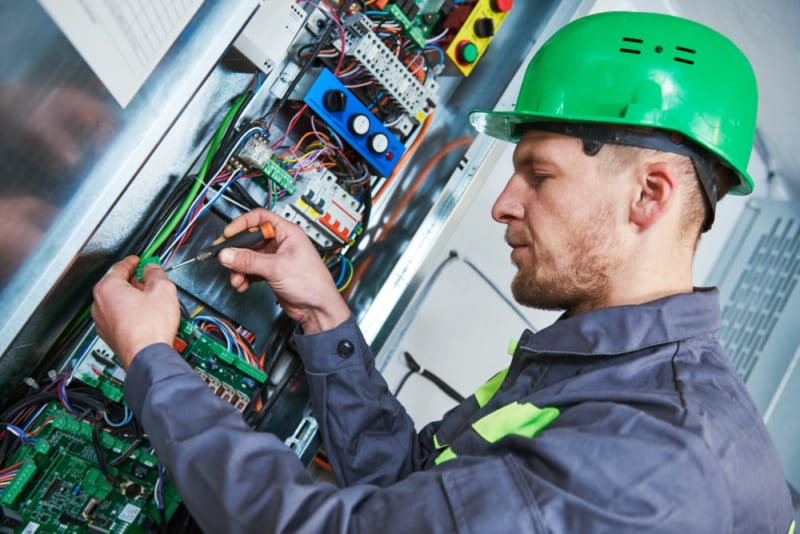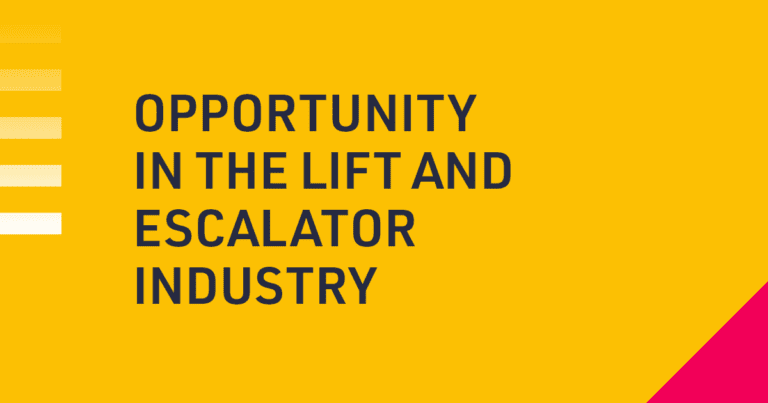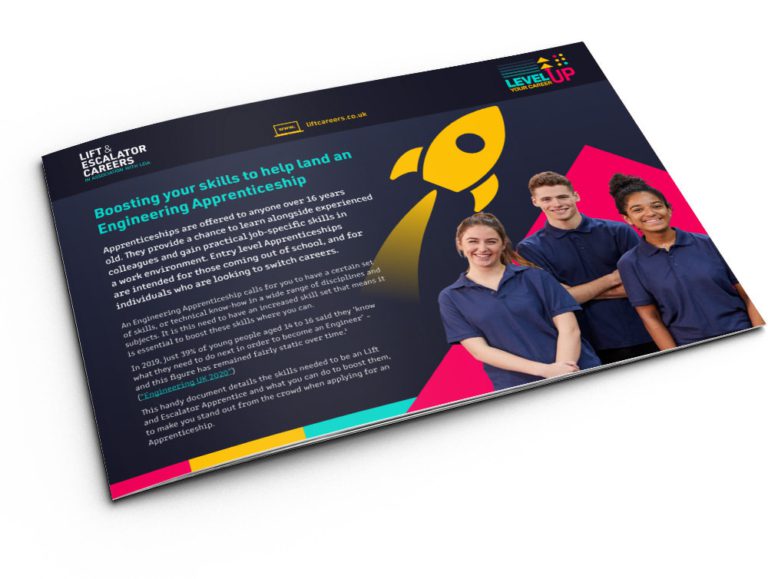Apprenticeships in the Lift & Escalator Industry
Working in the lift and escalators industry offers a unique mix of engineering and technology. And as an Apprentice, you’ll be right out there in the thick of it. Working in hotels, state-of-the art offices, football clubs, airports, hospitals and homes. Across the country wherever there are lifts or escalators, you’ll be there. Working with experts who will give you one-to-one mentoring and help you grow. It’s hands-on learning where you can get stuck in, train in the latest engineering and technology and gain a nationally recognised qualification.

What will you learn?
You’ll work with all types of lifts, escalators and moving walkways. That involves learning about drive systems, motors, suspension and safety features as well as advanced technology like AI and predictive maintenance software. As a lift engineer it’s all about making sure that everything works safely and reliably.
Through testing, upgrading, repairing and maintaining lifts, you’ll develop your practical ability across electrical, mechanical and electrotechnical engineering. But it doesn’t stop there. You’ll also gain brilliant life skills like dealing with an emergency, communication and problem-solving.
An apprenticeship won’t just level up your career, it’ll level up your life.
Benefits in a nutshell
Earn as you learn
Hands-on training and one-to-one mentoring
Formal qualification
Gain confidence and life skills
It’s a brilliant career, but how do you get in?
What do I need to apply?
First thing’s first, you must be over 16, live in England and not be in full-time education. The rest varies depending on the employer. For a level 3 apprenticeship it’s usually three or four GCSEs at grades 9 to 4 (A* to C), or equivalent, and ideally include English, Maths, Science and Technology.
How do I look for an Apprenticeship?
Check out the Employers page on this site and you can learn all about a diverse range of companies that hire Apprentices in our industry.
When can I apply?
Most employers start taking applications between February and March and keep them open for a couple of months. Interviews happen over the summer for a September start. But some employers take applications all year round.
What’s the process?
Every employer’s different. But it’s typically three stages; a paper application or CV, a phone or video call interview and then a final interview or assessment day.
How do I stand out?
Employers will be looking for people with a real interest in engineering and a curious mind. Any hobbies or work experience that show this will help. But don’t forget the basics – be on time, friendly and communicate well.
How long is an Apprenticeship?
It can be anywhere between two and four years with three years as the average.
What Apprenticeship would I complete?
The Apprenticeship Standard is the Lift and Escalator Engineering Level 3 – it has 4 optional pathways depending on whether you decide to work on lifts, or escalators, and either installing, or maintaining them.
More details can be found via the Skills England website
Now you’re in, what’s in store for you?
How much will I be paid?
You’ll get paid at least the National Minimum Wage for apprentices which is £7.55 per hour. This rate is for anyone under 16 or in their first year of apprenticeship. If you’re 19 or over and you’ve completed your first year, you’re entitled to the National Minimum Wage for your age.
What are the hours?
About 40 hours per week, 9am-5pm, 5 days a week. You’ll spend most of your time out working with an experienced engineer with one day a week for study. You’re entitled to at least 20 days paid holiday a year plus bank holidays. Lift engineers often have to respond quickly, so sometimes you’ll need to work flexibly.
What will I be doing day-to-day?
It’s a structured programme that involves studying with a training provider alongside hands-on learning. You’ll start with the basics – learning about the industry and different components – and then you’ll be able to put what you learn into practice. Most of your week will be spent out and about with an experienced engineer helping to install, maintain and repair lifts or escalators and moving walkways.
How do I pass my Apprenticeship?
To become qualified there are three elements that you need to successfully complete.
- Tailored ‘On Programme’ Training
This is completed on the job and determined by your training needs. You’ll need to show you can perform well in the job and you’ve gained the practical skills your employer requires. These are based on the core apprenticeship standard and one of the four routes: Lift installation / Escalator and moving walk installation / Lift servicing and repair / Escalator and moving walk servicing and repair - Level 2 in English and Mathematics
If you’re under 19 when you start your apprenticeship, and you don’t have GCSE’s you’ll need to pass a maths and English qualification before your apprenticeship is complete. - Apprenticeship Assessment
This is the final sign of for the apprenticeship award. It contains 3 sections; a knowledge test, a practical assessment and a professional discussion underpinned by a portfolio of evidence.
What are the qualifications?
You may get a Level 3 NVQ Diploma in Engineering and could also achieve technical certificates like BTEC Level 3 Diploma in Electrical/Electronic Engineering or City & Guilds Level 3 Certificate in Electrotechnical Technology. The qualification you get depends on the ‘On programme’ route used by your employer. You’ll also achieve the ‘Introduction and fundamentals of Lift Technology’ certificate Awarded by LEIA.
You’ve qualified! You’ve levelled up. What’s next?
What happens after I complete my apprenticeship?
Firstly, enjoy the moment. It’s a brilliant achievement and you should feel good about earning it. Because they’ve invested so much in you, it’s very likely that your current employer will offer you a permanent job with a higher salary that suits your skills. You’ll also get a formal certificate of your qualification.
What other training could I do?
With the Level 3 Apprenticeship your learning journey’s really just beginning. You’ll continue to get on-the-job mentoring and experience and you can develop your skills in different specialisms. You could potentially go on to Higher Level 4 Apprenticeship which is the equivalent of a Degree.
Where could I take my career?
The Lift and Escalator industry is the perfect place for people with ambition. As you gain more experience and qualifications, your opportunities to progress get bigger. You could take up a specialism or move into other areas of the industry like operations, sales or management. There’s no limit.
Are there any benefits to changing employer?
Your qualification makes you highly skilled and sought after and there are many employers in our sector. They all offer different things. Maybe you want to work abroad, or you’d like to specialise in a particular area or you want to work for a different sized company. It’s all there for you to explore. But it’s also a good idea to talk to your current employer about your ambitions, they’ve supported you up to this point so they’ll be keen to continue to help you grow.
Should I join a professional organisation?
Joining a professional organisation plugs you into a network of advice, news and opportunities in our industry. It also demonstrates your commitment to constantly improving your skills. You might want to check out LEIA, the Engineering Council and the Society of Operations Engineers.
Latest knowledge

Opportunity in the Lift and Escalator Industry
Most people don’t spend too much time thinking about lifts and escalators – which only goes to show how reliable they are. The people that keep them moving are Lift and Escalator Engineers who are skilled individuals […]
Read More
Boosting Your Skills to Help Land an Engineering Apprenticeship
This handy document details the skills needed to be a Lift and Escalator Apprentice and what you can do to boost them, to make you stand out from the crowd when applying for an Apprenticeship. […]
DOWNLOAD NOW
Lift & Escalator Apprentice Engineer Personality Types
It takes a special person to become a great Lift/Escalator Apprentice – someone with ambition, the ability to work hard and train to the highest standards; someone with the maturity to focus and succeed and […]
Read MoreFind employers
There’s a brilliantly diverse range of employers in our industry. Lifts and Escalators are essential to keep everything moving, so we’re constantly growing. If you want to level up your career, you’ll find your perfect employer here.
Search Now
